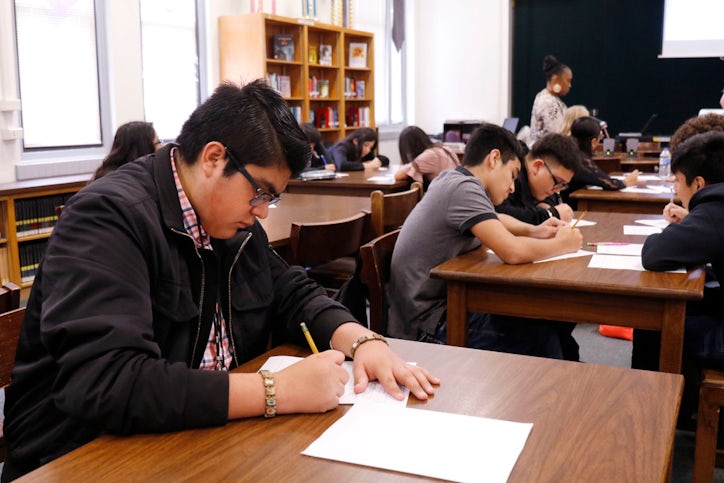Even as we read this terrible news account on how the U.S. could lose an estimated 20,000 teachers, many bilingual, as DACA is phased out—which many of us hope will not actually happen—UNT Dallas is moving in a different direction under the excellent leadership of Dean John Gasko and many others, including Macario Hernandez, Hector Flores, Florencia Velasco Fortner, president and CEO of The Concilio, former UNT-Dallas Dean Sheryl Santos-Hackett.
 |
| Artist Hector Rodriguez |
I love their super-hero, marketing approach, as it helps make the field attractive—which it of course is and can be—for the right individuals.
Dallas' Grow Your Own (GYO) educator project is an initiative of the National Latino Education Research and Policy Project (NLERAP [pronounced "nel-rap"]) cited in my edited volume, Growing Critically Conscious Teachers. Our dream is to grow critically conscious teachers everywhere—a majority of whom we hope are additionally bilingual, bicultural, and biliterate. I'm so happy to see H-E-B and the Meadows Foundation come through for our community in Dallas, Texas.
I should additionally note that Dean Gasko is a former student of mine and graduate of the Department of Educational Policy and Leadership (formerly, the Department of Educational Administration) at the University of Texas at Austin. You make us very proud, John.
This is not only a game changer, but also a dream come true. So I'm mostly happy for our students and our state.
Angela Valenzuela
c/s
One in five kids struggles with English in the state’s public schools, and they don’t have nearly enough teachers to help them all.
So the University of North Texas at Dallas is investing millions to build a bilingual teacher “superhighway” to train more of these badly needed educators through its Emerging Teachers Institute.
The institute is recruiting aggressively through grass-roots campaigns and now offers an accelerated pathway to a degree for some students.
That’s gotten the attention of Luis Borja, a Sunset High School freshman who already knows he wants to be a bilingual teacher. At just 15 years old, Luis recently attended a symposium organized by UNT-Dallas where he learned about a young Oak Cliff community activist who taught third grade at his old elementary school.
Luis can see himself doing the same. Growing up, he was frustrated for classmates who struggled to learn because there weren’t enough teachers who could speak to them in their native Spanish.
“Someone has to be the leader to help them get on their feet,” he said. “In elementary, I saw how some couldn’t communicate and had trouble speaking. I felt bad for them. How come there was no one to help them? How come no one could step up and be a leader for them?”
So the University of North Texas at Dallas is investing millions to build a bilingual teacher “superhighway” to train more of these badly needed educators through its Emerging Teachers Institute.
The institute is recruiting aggressively through grass-roots campaigns and now offers an accelerated pathway to a degree for some students.
That’s gotten the attention of Luis Borja, a Sunset High School freshman who already knows he wants to be a bilingual teacher. At just 15 years old, Luis recently attended a symposium organized by UNT-Dallas where he learned about a young Oak Cliff community activist who taught third grade at his old elementary school.
Luis can see himself doing the same. Growing up, he was frustrated for classmates who struggled to learn because there weren’t enough teachers who could speak to them in their native Spanish.
“Someone has to be the leader to help them get on their feet,” he said. “In elementary, I saw how some couldn’t communicate and had trouble speaking. I felt bad for them. How come there was no one to help them? How come no one could step up and be a leader for them?”


No comments:
Post a Comment